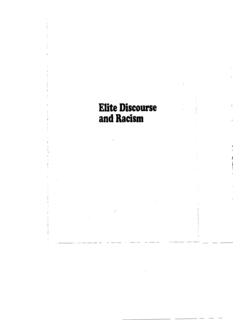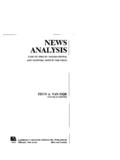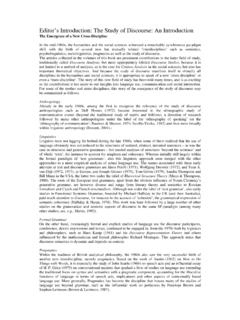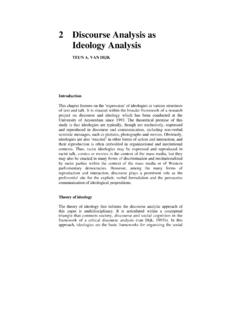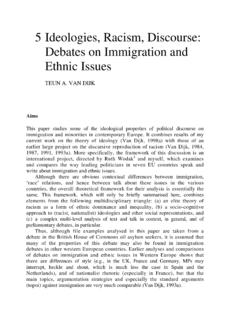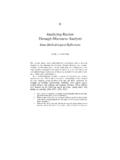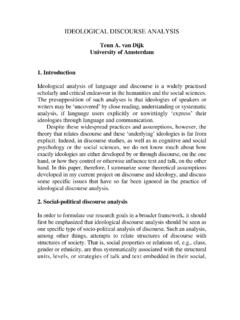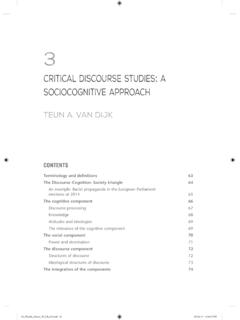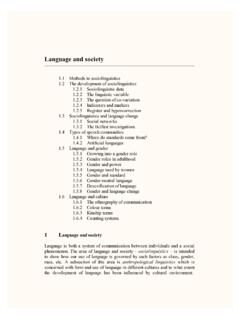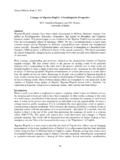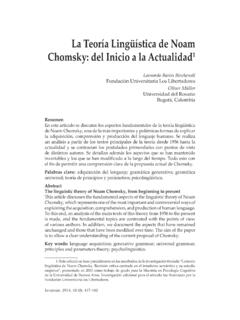Transcription of Discourse-Cognition-Society - Discourse in Society
1 Published in: Christopher Hart & Piotr Cap (Eds). Contemporary Studies in Critical Discourse Analysis. (pp. 121-146. London; Bloomsbury, 2014. Discourse -Cognition- Society Current state and prospects of the socio-cognitive approach to Discourse Teun A. van Dijk Pompeu Fabra University, Barcelona Version March 2013. Introduction The critical study of Discourse should be based on a multidisciplinary theory explicitly relating Discourse structures with societal structures and thus describe and explain how structures of power and power abuse are discursively enacted and reproduced. The main thesis of a socio-cognitive contribution to this theory is that these relations between Discourse and Society are cognitively mediated.)
2 In this chapter we sketch the current state of this socio-cognitive approach as well as its future prospects, based on our research of the past 30 years (see also *Van Dijk, 2008). Most earlier and contemporary theories in Critical Discourse Studies (CDS), as well as in neighboring disciplines, such as sociolinguistics and linguistic anthropology, assume a direct link between Discourse and Society (or culture). It is generally assumed in these disciplines that social variables such as those of social class, power, gender, ethnicity or age directly cause or control language variation and structures of text and talk. The problem is that the nature of these causal or similar direct relationships is not made explicit but taken for granted or reduced to unexplained correlations.
3 Another fundamental problem is that societal structures and Discourse structures are of a very different kind and hence cannot enter in a causal relationship in the first place. A. socio-cognitive theory assumes that social structures need to be interpreted and represented 1. cognitively and that such mental representations affect the cognitive processes involved in the production and interpretation of Discourse . The same principle holds true for the reverse relationship, namely how Discourse is able to affect social structure namely through the mental representations of language users as social actors. Similar theoretical limitations characterize contemporary interactionist' approaches to talk, for instance in Conversation Analysis (CA) and Discursive Psychology (DP).
4 These approaches directly link the structures of talk with structures of interaction at the micro- order of Society . They thereby ignore that also this relationship is cognitively mediated: Trivially, language users not only act but also think when they speak. Denying or ignoring the existence or the relevance of this cognitive dimension of interaction is in many ways a contemporary version of similar arguments defended by behaviorism decades ago, such as the alleged lack of observability' or sociality' of cognitive representations. Many aspects of conversation, such as the role of implicit or implicated meanings, thus remain without explicit description or explanation.
5 Indeed, even more generally, the very definition of the fundamental notion of action' without a cognitive basis is thus reduced to a behaviorist concept of observable' conduct. In fact, the same is true for the meaning of text or talk, which also hardly can be theoretically accounted for in terms of observability in the common empiricist sense. From the point of view of contemporary cognitive science these statements may seem trivial although the detailed theoretical and analytical implications of these assumptions are only partly understood. Even the cognitive psychology of Discourse until today has no explicit theory of how social and communicative environments' affect text and talk.
6 Hence, one of the tasks of this chapter is to sketch the main tenets of just such a theory as the core of the cognitive interface of the relations between Discourse and Society . Cognition The cognitive interface of the relations between Discourse and Society is as complex as the very structures of text and talk, on the one hand, and those of Society , on the other hand, and we are here able only to summarize some of its most relevant notions. Hence, we ignore many details of the properties of Working Memory and various aspects of Episodic 2. and Long Term Memory, cognitive processing as well as their neuropsychological foundations (of many contemporary studies in these areas, see, , *Baddeley, 2007.)
7 *Tulving & Craik, 2000). Instead, we focus on those aspects of the structure and role of personal and social cognition that directly account for the most fundamental properties of the production and comprehension of Discourse (for details, see *Graesser, Gernsbacher & Goldman, 2003)1. Personal vs. Social Cognition A first crucial distinction of the cognitive framework underlying language use and Discourse is that between personal and social cognition. This distinction is vaguely reflected in the division of labor between cognitive and social psychology, although we obviously deal with cognition in both cases. Personal cognition accounts for the ways individual language users, as members of linguistic, epistemic and social communities, subjectively produce and understand text and talk.
8 Although such an account is framed in terms of the mental and neurological structures and processes of individual language users, it must be based on socially shared representations of individual social actors as members of various social collectivities. At the same time these mental representations and processes are activated, applied and adapted to the properties of ongoing and situated social interaction and communication, through which they are acquired, changed and socially reproduced in the first place. In other words, the personal and the social in Discourse processing are inextricably intertwined. In this chapter we limit our account of personal cognition, and hence the subjective and unique properties of individual text and talk, to a brief summary of the role of different kinds of mental model.
9 On the other hand, the social dimension of the cognitive interface between Discourse and Society will be described in terms of the structures and the role of knowledge on the one hand, and shared social attitudes and ideologies, on the other hand. 1. Not only in the cognitive psychology of Discourse , but also on the societal and discursive dimensions of this chapter there is a vast literature. Hence, we shall only cite a few relevant books for background reading of this paper, or where specific notions have been borrowed from other authors. 3. Situation Models Many studies in the last three decades of the cognitive psychology of Discourse have shown the fundamental role of mental models for the production and comprehension of Discourse and more generally for interaction and the perception of the environment (*Garnham, 1987; *Gentner & Stevens, 1983; *Johnson-Laird, 1983; *Oakhill & Garnham, 1987; *Van Dijk & Kintsch, 1983).
10 Thus, it has generally been assumed that the understanding of Discourse involves the ongoing activation, updating or construction of situation models that represent the events or the situation the Discourse is about (*Van Dijk & Kintsch, 1983). Since such models are the cognitive correlate of what was traditionally called the referential' aspect of language use, such models may also be called semantic. They account for what in philosophical terms is called aboutness, that is, the intentional' or representational aspect of language use. Situation models should not be confused with the (intensional) meaning of Discourse , which is a specific and different level and aspect of Discourse processing.
